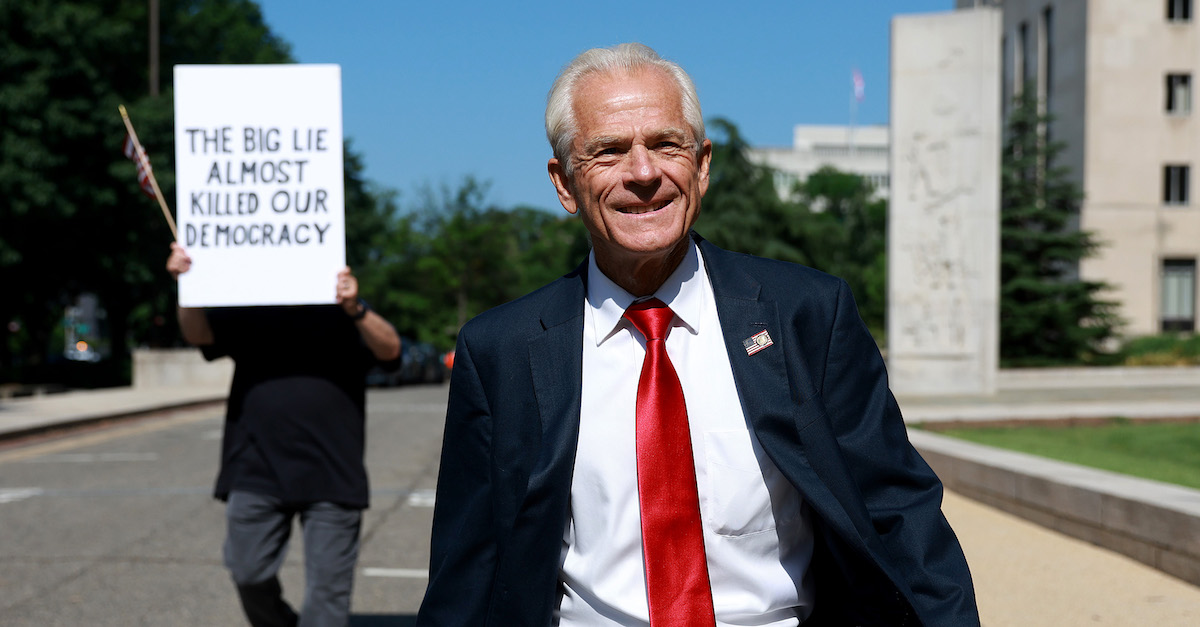
Former Trump White House Advisor Peter Navarro arrives for his arraignment at the Prettyman U.S. Courthouse on June 17, 2022 in Washington, D.C.
Former White House advisor Peter Navarro lost his request to hunt for evidence of selective prosecution on Monday, as a federal judge found he lacked even a “colorable” claim to build his case.
In June, federal authorities arrested Navarro on two counts of contempt of Congress. The FBI handcuffed him and read him his Miranda warnings. Navarro quickly contrasted his treatment to that of ex-President Donald Trump’s former chief of staff Mark Meadows and social media manager Dan Scavino, neither of whom were charged — let alone arrested and taken into federal custody.
For Navarro, the Justice Department’s still-unexplained decisions declining to prosecute Meadows and Scavino were evidence of his own selective prosecution. Navarro claimed that prosecutors went after him because he spoke out publicly, and Meadows and Scavino did not.
But U.S. District Judge Amit Mehta rejected those arguments in a 13-page ruling on Monday, finding Navarro’s case different from other top Trump aides for multiple reasons.
“First, both Meadows and Scavino received correspondence from President Trump directing them not to respond to the Select Committee’s subpoena,” the ruling notes, adding that both of those men forwarded those communications to the Jan. 6 Committee.
“Defendant, on the other hand, received no written or oral direction from the former president to invoke any privileges or immunities with respect to the Select Committee subpoena,” Mehta noted. “The fact that defendant received no specific instruction to invoke executive privilege, while Meadows and Scavino did, is a material difference and a legitimate prosecutorial factor that distinguishes defendant from those men. Such factual distinctions matter.”
Judge Mehta, a Barack Obama appointee, also pointed out, in a footnote, that Navarro did not produce any evidence that Meadows and Scavino have been silent in their views of the government and the Jan. 6 Committee.
On the other hand, Mehta said, counsel for Meadows and Scavino engaged in “extensive communications” with the committee. The ruling notes that Meadows ultimately produced 2,300 text messages and a privilege log showing he withheld more than 1,000 others based on various privileges.
“These interactions with the Select Committee stand in contrast to those of Defendant, who communicated with the Select Committee over a three-week period largely through terse emails and public statements,” the memorandum opinion and order states. “He made no apparent effort to accommodate the Select Committee, let alone produce records as Meadows did.”
Navarro also bristled about the fact that authorities did not allow him to turn himself in, arresting him in an airport and processing him as if he were a “dangerous felon.”
“The court acknowledges that there are times where the government permits non-violent misdemeanants to self-surrender after being charged,” the opinion says. “But the government has provided at least a plausible explanation for why it took a different course here.”
Just days before his indictment, Navarro refused to open the door for case agents seeking to serve him with a subpoena and interview him — telling the agents “get the f*** out of here,” the judge noted.
Court documents released shortly after his arrest quote Navarro as having called his arresting agents “kind Nazis.”
Navarro did not immediately respond to Law&Crime’s request for comment.
Read the opinion here:
[Image via Joe Raedle/Getty Images]